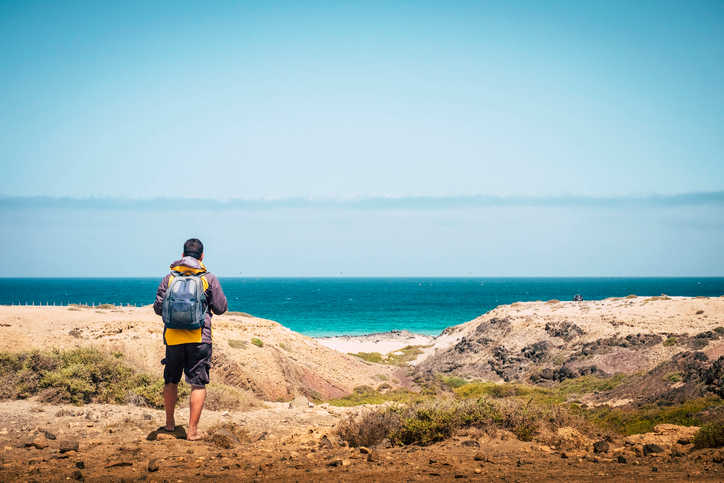Adventure Therapy and Mental Health

Take a moment to think about the things that you enjoy. How often have you thought about going to a new country or visiting a different biome that only exists high up in the mountains, or maybe you even imagined what it would be like to be up in a hot air balloon? It could just be as simple as wanting to leave the city you are in to see how much bigger the world is. Believe it or not, one of the best forms of therapy is a change of scenery and exploration.
Adventure therapy can positively affect a person's overall mood, outlook on life, and confidence. Have you ever walked outside during a sunny day and noticed that perhaps you smiled a bit or felt a sort of relief when the sun hit your face? It was likely caused by the effect that sunlight naturally has on a person's mood. Vitamin D is good for the skin, and sunlight itself can positively impact mood and be calming.
Get Out There
Often, there is a feeling of lethargy in mental health disorders like depression or anxiety and a need to be in bed with little or no contact with others. Someone may sleep longer and struggle to fall asleep, resulting in a poor sleep schedule. This itself is a tie into isolation and refusal to leave the house or the bedroom. These are factors that hinder the treatment of a disorder.
It is common for patients to be put on a sleep schedule during inpatient residential treatment and encouraged to make their bed and stay in groups to discourage poor sleep habits. It can be challenging to resist the urge to sleep when in a state of distress. Sleeping can feel therapeutic since it is a relief of mental pressure, if only temporarily for some. This is why literally "getting out" is highly recommended. Rediscover what brings you joy, what gets you thinking, and offers a new perspective on life.
Going on an Adventure
What exactly is adventure therapy? According to the article 'Wilderness adventure therapy effects on the mental health of youth participants," published by Science Direct, "Adventure therapy uses experiential learning activities in outdoor environments for assessment and intervention at an individual and group level in order to effect psychological and/or behavioral therapeutic change." A few examples of these include:
Problem-solving activities
Rope challenge courses
Rafting
Caving
Camping
Backpacking
Truly going on an adventure can include a wide variety of activities. This kind of experiential therapy is relatively new and only began in the later twentieth century as a more recent treatment.
The same ScienceDirect article states that a Wilderness Adventure Therapy (WAT) outpatient program was developed by Simon Crisp. This WAT included a ten-week manualized part program divided into four components. Within this, a study was conducted on a 15-year-old patient (Susan) that yielded surprising results. Upon program completion, Susan showed increased self-confidence, personal insight, assertiveness, sociality, and clarity of future plans.
At the two-week follow-up, Susan had returned to mainstream schooling with perfect attendance, and psychometric evaluation showed an increase in coping skills, a reduction in reported emotional problems, and a slight increase in self-esteem. At the six-month follow-up, Susan continued to attend school full-time and was involved in a range of extra-curricular activities.
Boosting Self Esteem
Human beings are capable of many things when encouraged and provided opportunities and enrichment. When an achievement has been reached, whether it be in a game, work, or cultivation, the feeling of completion can be encouraging to some and provide that boost of motivation needed to feel like you are capable of so much more. Going on an adventure and discovering something that you enjoy can give you a sense of purpose and bring back a sense of self-realization and importance that perhaps was once lost.
In the article "Therapy gone wild," published by the American Psychological Association, psychologists have found that these journeys can also be taken amongst family just so good habits are encouraged and continued. According to this article, "Psychologist Scott Bandoroff, Ph.D., launched the field of 'wilderness family therapy' in 1990 when he observed that young people who had made great gains on wilderness therapy trips tended to lose ground when they got home, the result of returning to negative family dynamics."
This highlights the importance of family therapy in conjunction with adventure-based interventions, as family dynamics play a crucial role in maintaining therapeutic gains made during treatment.
The Point of it All
Getting out of your comfort zone and discovering new therapies such as adventure therapy opens up a wide variety of possibilities and confidences. It may seem daunting, and starting small is also a good thing. Adventures don't have to be halfway across the world or even in another state. They can happen in your own backyard.
Opening up your front door, taking a walk, and observing nature in your backyard is an adventure on its own as it allows you just to take a moment and notice what our world has to offer. Smelling the rain just before it comes and listening to the sounds that birds or cicadas make can be just as rewarding as any far-off destination. Life is overwhelming, and sometimes a person just needs to stop time for just a little while to reconnect and discover what makes life worth living for them and what can be missed by being squished into the great compactor of life.
Adventure therapy is particularly beneficial as part of holistic treatment approaches that address the whole person - mind, body, and spirit. When combined with traditional therapies like individual therapy and group therapy, adventure-based interventions can provide a well-rounded treatment experience.
For individuals dealing with trauma, adventure therapy can be especially healing, as it helps rebuild confidence and trust in oneself while processing difficult experiences in a supportive outdoor environment. The approach aligns well with trauma-informed care principles.
Adventure therapy can be incorporated into various levels of care, from outpatient treatment programs to more intensive partial hospitalization programs, depending on individual needs and treatment goals.
Finding Adventure-Based Treatment
Adventure therapy offers a natural and engaging approach to mental health treatment that may appeal especially to those who enjoy the outdoors. The goal of adventure therapy is to help you reconnect with yourself, build confidence, and develop healthy coping strategies in a supportive environment.
Your mental health is just as important as your physical health, and there are many evidence-based treatment options available, including both clinical and holistic approaches. Whether you're interested in traditional cognitive behavioral therapy, adventure-based interventions, or a combination of approaches, there is always a therapy that can help you reach your greatest success.
If you're interested in exploring adventure therapy or other experiential treatment options, use our treatment directory to find mental health providers in California who offer these innovative approaches. Our directory includes providers who specialize in holistic and experiential therapies, accept various insurance plans, and can help you find the right combination of treatments to support your mental health journey.
Locate Treatment Centers Near You
Enter your location to discover facilities offering the care and support you need in your area.


